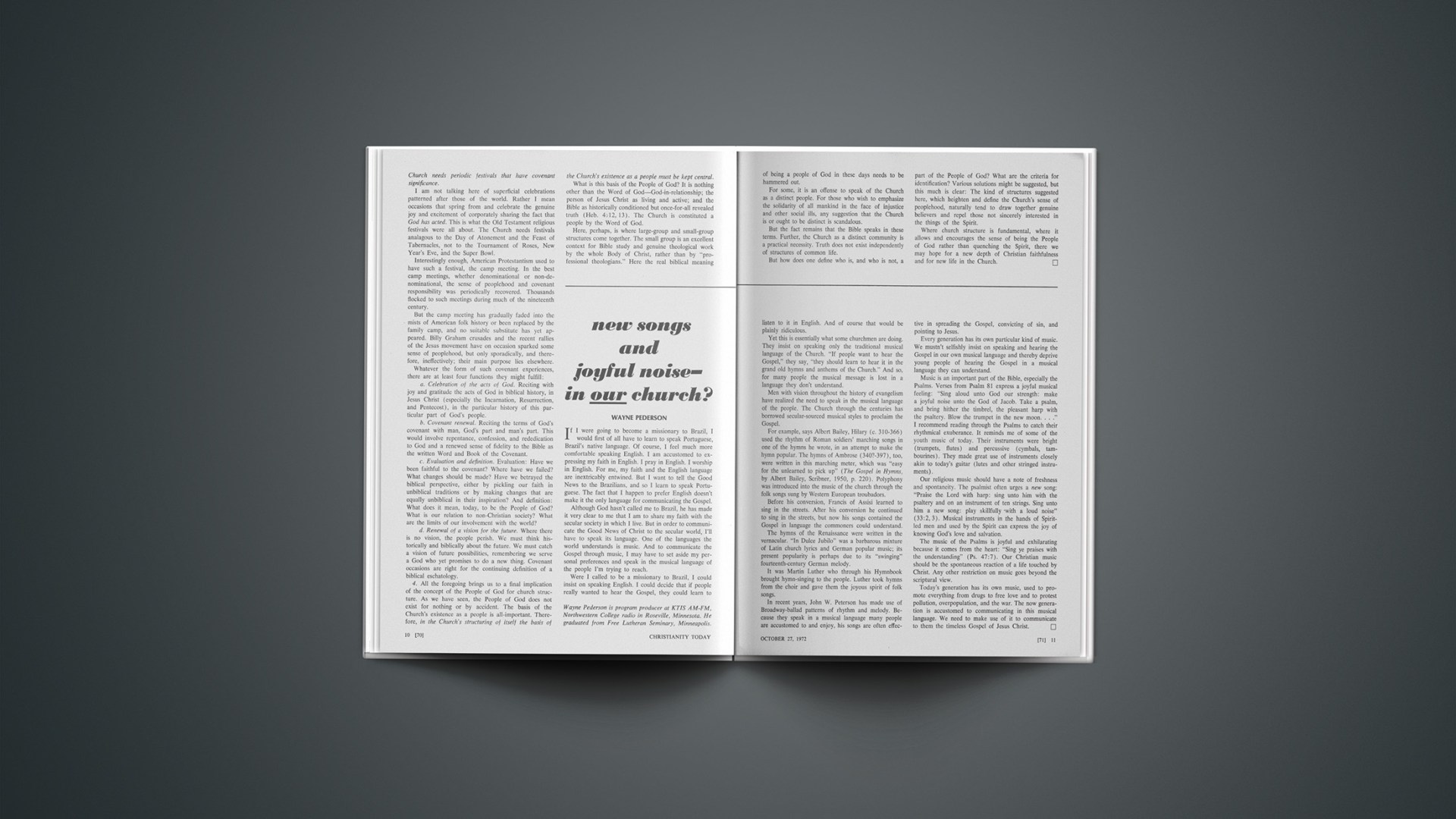If I were going to become a missionary to Brazil, I would first of all have to learn to speak Portuguese, Brazil’s native language. Of course, I feel much more comfortable speaking English. I am accustomed to expressing my faith in English. I pray in English. I worship in English. For me, my faith and the English language are inextricably entwined. But I want to tell the Good News to the Brazilians, and so I learn to speak Portuguese. The fact that I happen to prefer English doesn’t make it the only language for communicating the Gospel.
Although God hasn’t called me to Brazil, he has made it very clear to me that I am to share my faith with the secular society in which I live. But in order to communicate the Good News of Christ to the secular world, I’ll have to speak its language. One of the languages the world understands is music. And to communicate the Gospel through music, I may have to set aside my personal preferences and speak in the musical language of the people I’m trying to reach.
Were I called to be a missionary to Brazil, I could insist on speaking English. I could decide that if people really wanted to hear the Gospel, they could learn to listen to it in English. And of course that would be plainly ridiculous.
Yet this is essentially what some churchmen are doing. They insist on speaking only the traditional musical language of the Church.” If people want to hear the Gospel,” they say, “they should learn to hear it in the grand old hymns and anthems of the Church.” And so, for many people the musical message is lost in a language they don’t understand.
Men with vision throughout the history of evangelism have realized the need to speak in the musical language of the people. The Church through the centuries has borrowed secular-sourced musical styles to proclaim the Gospel.
For example, says Albert Bailey, Hilary (c. 310–366) used the rhythm of Roman soldiers’ marching songs in one of the hymns he wrote, in an attempt to make the hymn popular. The hymns of Ambrose (340?–397), too, were written in this marching meter, which was “easy for the unlearned to pick up” (The Gospel in Hymns, by Albert Bailey, Scribner, 1950, p. 220). Polyphony was introduced into the music of the church through the folk songs sung by Western European troubadors.
Before his conversion, Francis of Assisi learned to sing in the streets. After his conversion he continued to sing in the streets, but now his songs contained the Gospel in language the commoners could understand.
The hymns of the Renaissance were written in the vernacular. “In Dulce Jubilo” was a barbarous mixture of Latin church lyrics and German popular music; its present popularity is perhaps due to its “swinging” fourteenth-century German melody.
It was Martin Luther who through his Hymnbook brought hymn-singing to the people. Luther took hymns from the choir and gave them the joyous spirit of folk songs.
In recent years, John W. Peterson has made use of Broadway-ballad patterns of rhythm and melody. Because they speak in a musical language many people are accustomed to and enjoy, his songs are often effective in spreading the Gospel, convicting of sin, and pointing to Jesus.
Every generation has its own particular kind of music. We mustn’t selfishly insist on speaking and hearing the Gospel in our own musical language and thereby deprive young people of hearing the Gospel in a musical language they can understand.
Music is an important part of the Bible, especially the Psalms. Verses from Psalm 81 express a joyful musical feeling: “Sing aloud unto God our strength: make a joyful noise unto the God of Jacob. Take a psalm, and bring hither the timbrel, the pleasant harp with the psaltery. Blow the trumpet in the new moon.…” I recommend reading through the Psalms to catch their rhythmical exuberance. It reminds me of some of the youth music of today. Their instruments were bright (trumpets, flutes) and percussive (cymbals, tambourines). They made great use of instruments closely akin to today’s guitar (lutes and other stringed instruments).
Our religious music should have a note of freshness and spontaneity. The psalmist often urges a new song: “Praise the Lord with harp: sing unto him with the psaltery and on an instrument of ten strings. Sing unto him a new song: play skillfully with a loud noise” (33:2, 3). Musical instruments in the hands of Spirit-led men and used by the Spirit can express the joy of knowing God’s love and salvation.
The music of the Psalms is joyful and exhilarating because it comes from the heart: “Sing ye praises with the understanding” (Ps. 47:7). Our Christian music should be the spontaneous reaction of a life touched by Christ. Any other restriction on music goes beyond the scriptural view.
Today’s generation has its own music, used to promote everything from drugs to free love and to protest pollution, overpopulation, and the war. The now generation is accustomed to communicating in this musical language. We need to make use of it to communicate to them the timeless Gospel of Jesus Christ.
George M. Marsden is associate professor of history at Calvin College, Grand Rapids, Michigan. He has the Ph.D. (Yale University) and has written “The Evangelical Mind and the New School Presbyterian Experience.”










